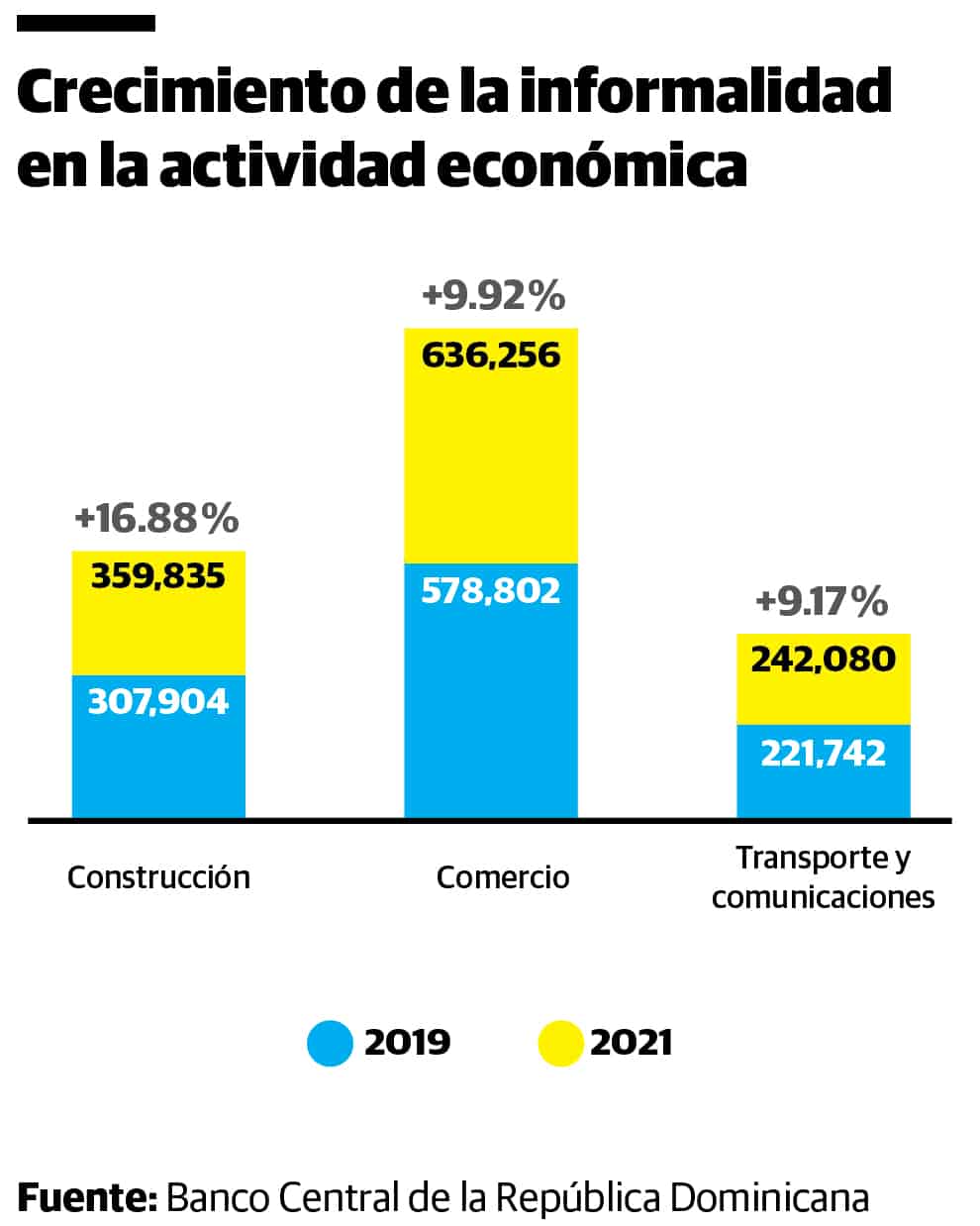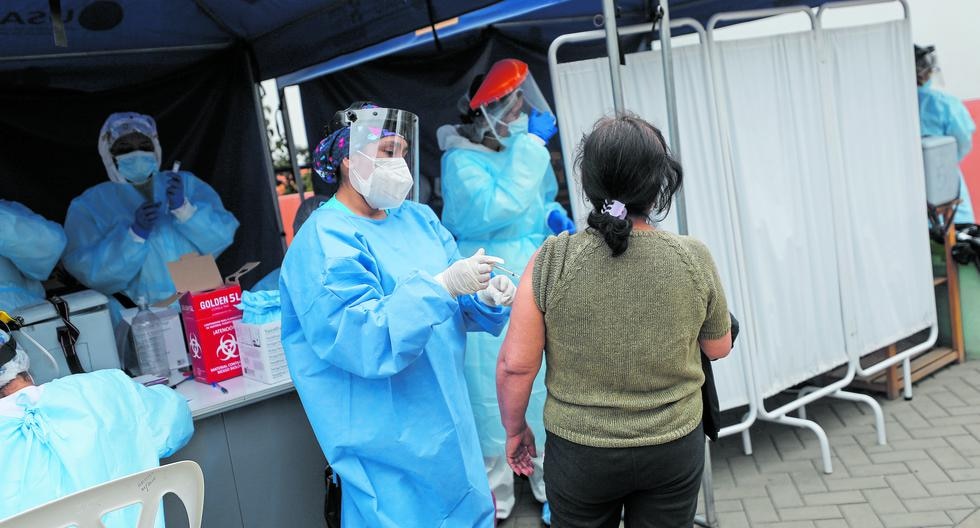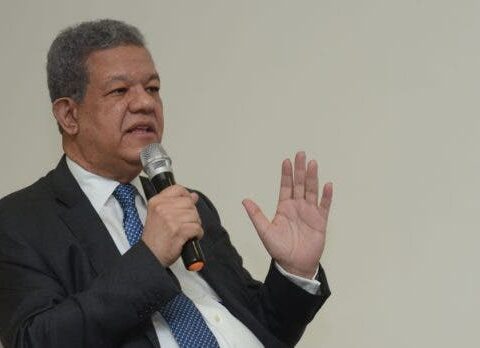The sector construction has maintained an important participation in the Dominican economy. Only last year it was the second activity that contributed the most to the Gross Domestic Product (GDP) of the country, only surpassed by hotels, bars and restaurants. However, it registers a high labor informality that increased 16.88% since the beginning of 2019, an increase that its representatives attribute to the consequence of a resolution of the National Social Security Council.
At the beginning of 2019 there were 307,904 people employed informally in the sector construction and at the end of 2021 it rose to 359,835, according to data from the Central Bank of the Dominican Republic, representing an informality of 90.20% compared to a formality of 9.79% (39,060 formal jobs).
In its report on the preliminary results of economic activity during 2021, the Central Bank explains that the performance of the construction in those 12 months it was associated with the promotion of private investment for the development of important real estate projects of residential units, the expansion of installed tourist capacity, as well as the execution with public capital of initiatives for the reconstruction and maintenance of communication routes land and urban improvement.
“As of 2019, there was a resolution (471-01) of the National Social Security Council that began to apply a salary escalation every time one registered the workers of the construction”, architect Jorge Montalvo, president of the Dominican Association of Home Builders and Promoters (Acoprovi), told Diario Libre.
The resolution establishes that employers who, due to the nature of their economic activity, have salaried employees who do not work the full month in a dependency relationship and, due to this, these personnel receive a remuneration lower than the established minimum wage, must request the TSS the validation of their condition so that the system allows them to register them and the calculations of contributions and contributions are made based on the remuneration indicated by the employer.
It also indicates that the Single Information and Collection System (SUIR) will scale by default the salary of all registered workers with incomes below the minimum to the minimum salary of the economic sector to which the employer belongs.

Montalvo explained that before that resolution they could register workers by the days worked, for example: a plumber worked three or four days with one company and the remaining days with others until completing the month. Each one registered the same employee for the contracted days.
“In all the companies where the worker was, the income they had escalated, but over time that has become an unsustainable situation for the workers and for the companies because in the end there were workers who charged them up to double what they earned” Montalvo said.
Thus, he attributed to resolution 471-01 the reason why informality is constantly increasing in the sector construction. In fact, his representatives have been approaching the authorities with the mediation of the Minister of Labor to find a solution to the issue.
“Already the issue of Haitians, who did not register them in the TSS (Social Security Treasury), that had been resolved, and if they had their regularization card they could register. It was a process that was improving, but since 2019 the issue has been getting worse, “he said.
Meanwhile, the president of the Dominican Confederation of Small and Medium Enterprises of the Construction (Copymecon), Eliseo Cristopher, understands that the sector he represents should be measured differently than large companies.
“The MSMEs, which represent more than 98 percent of the country’s business fabric, a large part of these MSMEs are informal as a result of the fact that MSMEs are measured in the same way as large companies in the tax issue and even in the financing issue,” he said.
He considers that there should be a form of taxation for MSMEs different from that of large companies. Similarly, to advocate for a better financing system for this sector so that it can achieve greater growth.
Informality also grew in other sectors
According to data published by the Central Bank, the population employed by the formal and informal sectors, according to the branch of economic activity in the country, amounted to 4,422,840 people at the end of last year. Of this universe, about 50.91% (2,251,930) belongs to the informal sector and 49.08% (2,170,910) to the formal.
The data indicates that the sectors with the most formally employed persons in the country are: commerce (340,039), industry (321,093), education (268,657), public administration and defense (265,479); health and social assistance (183,750); hotels, bars and restaurants (164,867); transportation and communications (91,268), among others (+300,000).
Likewise, the sectors with the most informal employment are: commerce with a population of 636,256 people; construction with 359,835 people; agriculture and livestock (309,515); transportation and communications (242,080); hotels, bars and restaurants (184,003) and industry (141,237), among others (+340,000).
In the commerce sector alone, of a total of 976,295 jobs, 65.17% are informal and 34.82% formal.
Also, the agriculture and livestock sector is experiencing a scenario similar to that of the construction. This production area had 358,105 jobs. Of that total, 86.43% of the occupation was informal at the end of 2021.
Both the industry construction such as agriculture, they have a large percentage of Haitian labor that is mostly undocumented.
Between 2019 and 2021, the employed population exceeds the year prior to the pandemic. But formality fell 3.19%, going from 2,242,559 jobs in 2019 to 2,170,910 as of December 31, 2021. On the other hand, informality rose 4.97%. In 2019 it stood at 2,145,280 and went to 2,251,930 during 2021.








